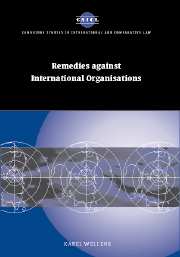Book contents
- Frontmatter
- Contents
- Acknowledgements
- List of abbreviations
- Introduction
- Part I General features of remedies against international organisations
- Part II Procedural aspects of remedial action against international organisations
- Part III Substantive outcome of remedial action against international organisations
- Part IV Alternative remedial action against international organisations and options for the future
- 16 Introduction to alternative remedial action against international organisations and options for the future
- 17 Pre-remedial action
- 18 Non-legal alternative remedial action
- 19 Amendment of existing judicial remedies
- 20 An inevitable role for the International Court of Justice
- Conclusion
- Bibliography
- Index
- CAMBRIDGE STUDIES IN INTERNATIONAL AND COMPARATIVE LAW
18 - Non-legal alternative remedial action
Published online by Cambridge University Press: 13 July 2009
- Frontmatter
- Contents
- Acknowledgements
- List of abbreviations
- Introduction
- Part I General features of remedies against international organisations
- Part II Procedural aspects of remedial action against international organisations
- Part III Substantive outcome of remedial action against international organisations
- Part IV Alternative remedial action against international organisations and options for the future
- 16 Introduction to alternative remedial action against international organisations and options for the future
- 17 Pre-remedial action
- 18 Non-legal alternative remedial action
- 19 Amendment of existing judicial remedies
- 20 An inevitable role for the International Court of Justice
- Conclusion
- Bibliography
- Index
- CAMBRIDGE STUDIES IN INTERNATIONAL AND COMPARATIVE LAW
Summary
The potential sequence of and interaction between political and legal remedies has been referred to earlier and is a natural consequence of the inter-linkage between the administrative, financial, political and legal forms of accountability. Based upon the analysis in the previous Parts of this study and taking into account the deficiencies, inadequacies and the insufficient degree of remedial potential (in terms of availability, procedural access and substantive outcome) in existing mechanisms for the various categories of potential claimants, this chapter now reviews non-legal alternative remedial actions. The extent to which the instruments considered here are able to fulfil a remedial purpose may vary, but they certainly should not be considered as mutually exclusive alternatives, quite the contrary: together with the amendment of existing judicial remedies, which will be dealt with in the next chapter, they present converging remedial opportunities vis-à-vis international organisations.
Suffice it to recall that non-legal remedial mechanisms address situations where the non-performance of non-legal obligations results in mere interests potentially or actually being affected, harm being caused but without there being any form of liability or responsibility on the part of the international organisation. As already seen, in such situations, because of the absence of any kind of legal relationship between the non-state entity and the organisation involved, no accountability is provided towards non-state actors. Non-legal remedies could provide suitable alternatives to the lack or insufficiency of mechanisms of redress by granting private parties direct access to a particular mechanism or office, eventually in combination with or followed by diplomatic protection by the national state vis-à-vis the organisation.
- Type
- Chapter
- Information
- Remedies against International Organisations , pp. 177 - 197Publisher: Cambridge University PressPrint publication year: 2002

